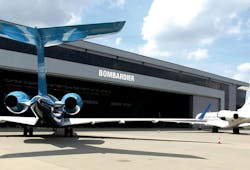Bombardier Installs 3,000+ Rooftop Solar Panels on Aircraft Maintenance Center at London Biggin Hill Airport
Bombardier, a Canadian business jet manufacturer, has installed more than 3,000 solar panels on the roof of its London Biggin Hill Service Center at the London Biggin Hill Airport to promote sustainable practices within the aviation industry and reduce energy consumption from the company’s facilities worldwide.
The PV solar panels will generate more than 1.133 million kWh, minimizing the annual carbon emissions by up to 252 tons and providing up to 32% of the facility’s total energy demand from an on-site renewable source.
The project was developed in collaboration with Zestec Renewable Energy, a funder, developer, and asset manager of renewable solutions and part of the Octopus Energy group.
"We are actively committed to ensuring that we are making aviation more sustainable, and this includes the design and implementation of sustainability-related projects in our service facilities around the world,” said Paul Sislian, EVP of Aftermarket Service & Strategy. “This recent installation is aligned with our company’s objective to manufacture and service aircraft with the smallest possible environmental impact."
Bombardier’s expanded London Biggin Hill Service Center, about 250,000 sq. ft., provides customers with complete heavy maintenance capabilities and is fully equipped to perform scheduled and unscheduled maintenance, modifications, and avionics installations for Bombardier Learjet, Challenger, and Global aircraft.
Additionally, the company’s Singapore Service Center at the Seletar Aerospace Park in Singapore, a 290,000 sq. ft. facility and LEED Silver-certified service center, includes new solar panel installations, electric vehicle charging, and Sustainable Aviation Fuel (SAF) capability.
The company is looking for environmentally beneficial solutions and aims to achieve a 25% reduction of greenhouse gas emissions by 2025 as compared to 2019.
Bombardier covers the totality of its flight operations with a sustainable aviation fuel blend using a Book-and-Claim system and is the only business jet OEM to publicly disclose the environmental impact of its entire product portfolio through the publication of Environmental Product Declarations (EPD) for all its in-production aircraft.
The company’s EcoJet research project is exploring the blended-wing-body aircraft configuration, which, through aerodynamics, propulsion, and other enhancements, targets reducing business jets' CO2 emissions by up to 50% compared to the current aircraft generation.
